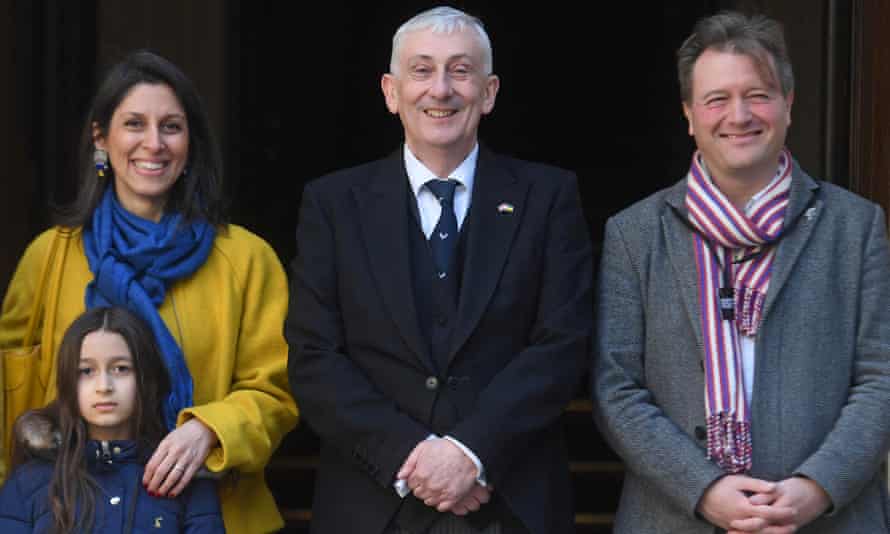
British-Iranian woman criticises UK government for length of time it took to secure her release from Tehran jail
Nazanin Zaghari-Ratcliffe has said she should have been released from detention in Iran six years ago and challenged the British government to explain why it had not paid the $400m (£303m) debt to Iran that Tehran said would bring her release earlier than last week.
Speaking publicly for the first time at a press conference since she was released, she described the “black hole” in her heart caused by the detention, and that it was her faith that kept her from losing hope.
She urged an end to the detention of other dual nationals still held in Iran, saying without their release “the meaning of freedom is never going to be complete”.
She paid tribute to her husband, Richard Ratcliffe, who said he would now be going into campaigning retirement after six years of “conspicuously waiting”.
At several points during the press conference, Zaghari-Ratcliffe differed from her husband when he thanked the British government for bringing her home.
She said she had seen five foreign secretaries over the course of six years, adding: “That is unprecedented given the politics of the UK. I love you Richard, respect whatever you believe, but I was told many, many times: ‘Oh we’re going to get you home.’ That never happened.”
She said this resulted in her finding it difficult to place trust in the words of successive foreign secretaries, adding: “I mean, how many foreign secretaries does it take for someone to come home? Five?”
“We all know … how I came home. It should have happened exactly six years ago. I should not have been in prison for six years.”
Zaghari-Ratcliffe, who was detained on 3 April 2016 by the Iranian Revolutionary Guards at Imam Khomeini airport after a holiday visit with her daughter, Gabriella, to her parents, said she had felt powerless in prison, and added that her greatest moment since her return was to braid her eight-year-old daughter’s hair.
She said she was told early on during her detention that there was something Iran wanted from Britain and that she would not be released until they got what they wanted.
“So, I didn’t know the details at the time. But I think it was the week two or week three that I was arrested, like six years ago, that they told me: ‘We want something off the Brits. We will not let you go until such time that we get it.’ And they did keep their promise.”
She said she had been a pawn in the hands of two governments over the past six years, and added: “I do not think anybody’s life should be linked to a kind of global agreement, whether it is a nuclear one or an environmental one.”
“Every human being has got a right to be free. What really upset me was that my life was linked to something that has got nothing to do with me,” she said.
Zaghari-Ratcliffe’s MP, Tulip Siddiq, said she would be writing to the chair of the foreign affairs select committee to conduct an inquiry into the Foreign Office’s handling of her case, a call endorsed by Richard Ratcliffe.

Zaghari-Ratcliffe said she did not believe in her release until the plane left Iranian airspace. “That moment was precious,” she said. She said her experience would always haunt her. “There is no other way around it. It will be with me.”
Zaghari-Ratcliffe also highlighted the continued detention of the British-US national and wildlife conservationist Morad Tahbaz, who, according to his family, has gone on hunger strike after he was taken back into prison after just 48 hours on furlough.
Zaghari-Ratcliffe had asked Tahbaz’s daughter Roxanne to join her at her press conference in Westminster.
Zaghari-Ratcliffe said: “To begin with Morad, but also the other dual nationals, members of religious groups, or prisoners of conscience who are … I mean, we do realise that if I have been in prison for six years there are so many other people we don’t know their names who have been suffering in prison in Iran.”
Richard Ratcliffe said the journey back to normality would involve “baby steps”, adding: “I am super proud of her strength and her survival and her grace.”













 Posted in
Posted in 











